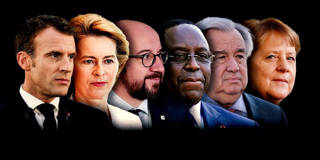We should not be afraid of a post-pandemic world that will not be the same as the status quo ante. We should embrace it and use all appropriate fora and available opportunities to make it a better world by advancing the cause of international cooperation.
PARIS – In September 2000, 189 countries signed the “Millennium Declaration,” shaping the principles of international cooperation for a new era of progress toward common goals. Emerging from the Cold War, we were confident about our capacity to build a multilateral order capable of tackling the big challenges of the time: hunger and extreme poverty, environmental degradation, diseases, economic shocks, and the prevention of conflicts. In September 2015, all countries again committed to an ambitious agenda to tackle global challenges together: the UN 2030 Agenda for Sustainable Development.
Our world has experienced diverging trends, leading to increased prosperity globally, while inequalities remain or increase. Democracies have expanded at the same time that nationalism and protectionism have seen a resurgence. Over the past decades, two major crises have disrupted our societies and weakened our common policy frameworks, casting doubt on our capacity to overcome shocks, address their root causes, and secure a better future for generations to come. They have also reminded us of how interdependent we are.
The most serious crises call for the most ambitious decisions to shape the future. We believe that this one can be an opportunity to rebuild consensus for an international order based on multilateralism and the rule of law through efficient cooperation, solidarity, and coordination. In this spirit, we are determined to work together, with and within the United Nations, regional organizations, international fora such as the G7 and G20, and ad hoc coalitions to tackle the global challenges we face now and in the future.

PARIS – In September 2000, 189 countries signed the “Millennium Declaration,” shaping the principles of international cooperation for a new era of progress toward common goals. Emerging from the Cold War, we were confident about our capacity to build a multilateral order capable of tackling the big challenges of the time: hunger and extreme poverty, environmental degradation, diseases, economic shocks, and the prevention of conflicts. In September 2015, all countries again committed to an ambitious agenda to tackle global challenges together: the UN 2030 Agenda for Sustainable Development.
Our world has experienced diverging trends, leading to increased prosperity globally, while inequalities remain or increase. Democracies have expanded at the same time that nationalism and protectionism have seen a resurgence. Over the past decades, two major crises have disrupted our societies and weakened our common policy frameworks, casting doubt on our capacity to overcome shocks, address their root causes, and secure a better future for generations to come. They have also reminded us of how interdependent we are.
The most serious crises call for the most ambitious decisions to shape the future. We believe that this one can be an opportunity to rebuild consensus for an international order based on multilateralism and the rule of law through efficient cooperation, solidarity, and coordination. In this spirit, we are determined to work together, with and within the United Nations, regional organizations, international fora such as the G7 and G20, and ad hoc coalitions to tackle the global challenges we face now and in the future.